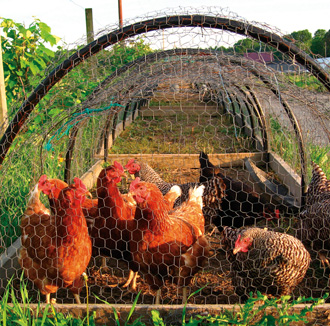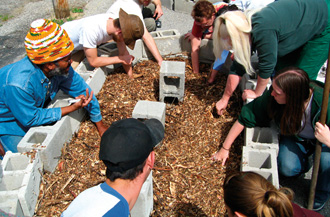Oberlin Alumni Magazine
Fall 2008 Vol. 104 No. 1
Restoring Community through Soil
 (photo by Brad Masi)
(photo by Brad Masi)
 Oberlin students and urban gardeners install an organic asphalt garden behind Full Circle Fuels, Oberlin’s alternative-fuels station.(photo by Brad Masi)
Oberlin students and urban gardeners install an organic asphalt garden behind Full Circle Fuels, Oberlin’s alternative-fuels station.(photo by Brad Masi)
Stanford University may have an atomic particle accelerator, but Oberlin has one that’s much more green—a low-tech, garbage-powered device known as a topsoil accelerator. Also known as a "worm tractor," this nifty tool was designed to restore degraded soils at the George Jones Farm and Nature Preserve, located about 1.5 miles east of campus.
The worm tractor is the newest in a line of techniques aimed at restoring the farm’s topsoil. Lined with strawbales, the tractor includes layers of wood mulch, campus food waste, micro-brewery waste, coffee grounds, and leaves. Worms are added to the mix to speed the decomposition and produce a rich compost. The first worm tractor was installed by Oberlin students in a sustainable agriculture practicum in 2007—just one example of the farm’s role as a learning laboratory in sustainable food systems.
The worm tractor complements the "chicken tractor", a mobile chicken coop used to build fertility on growing beds. The farm is also experimenting with "piggy plows," which use pigs to clear out brush and exotic plants in preparation for forest restoration. All of these techniques fit into the work of the New Agrarian Center (NAC), a nonprofit organization formed in 2003 to support the development of a sustainable regional food system in Northeast Ohio. In a region dominated by energy-intensive, industrial-style agriculture, the Jones Farm offers a return to older practices while also embracing forward-looking innovations such as strawbale construction, solar energy, and biodiesel processing.
The NAC named the 70-acre farm in the memory of George Jones, a revered Oberlin botany professor whose passion for teaching, natural history, and organic gardening inspired generations of students. Today, the farm supports a thriving community-supported agricultural enterprise managed by Aaron Englander ’06, Ben Jaffe, and a host of Oberlin students, interns, and volunteers. Getting the farm to its current level of production required the collaboration of an entire community—plants, animals, and humans. Manure from a nearby horse farm, composted leftovers from College co-ops, truckloads of leaf mulch from the city, cover crops, and the slow scratching of chickens all helped to restore the farm’s topsoil, which for years had been abused by heavy tractors, chemical fertilizers, and sheet erosion.
The same collaborative process that restores topsoil can also revitalize a community. Like the barren fields that once dominated the Jones Farm, many Cleveland neighborhoods lack access to the foods needed to support a healthy diet. Working with 15 community and state partners, the NAC helped develop City Fresh, a social enterprise that trains urban residents to offer local foods in so-called "food desert" neighborhoods that lack full-service grocers.
City Fresh supplies more than 800 urban families with local food through small markets that combine nutrition education and local food distribution. The Jones Farm became one of the first such suppliers in 2005. Oberlin students worked intensively to establish the first City Fresh center in a neighborhood with a 35 percent poverty rate. The Jones Farm has also hosted several urban market-garden training workshops that teach techniques such as small-scale composting, raised-bed gardening, and organic growing.
Oberlin College, Case Western Reserve University, and Bon Appétite (the food service vendor for both schools) pooled resources recently to purchase a diesel box truck to make food deliveries to about 18 neighborhoods in Cleveland and Lorain County. Sam Merrett ’04, who established Full Circle Fuels as a vegetable-oil service station in Oberlin, converted the truck’s engine to burn waste oil collected from dining halls and area restaurants.
The NAC has also invested more than $23,000 to launch 11 market gardens in Cleveland and Oberlin. Three were built atop blacktop, using asphalt gardening techniques. Most recently, the NAC cofounded the Cleveland/Cuyahoga County Food Policy Council to develop a new vision for regional agriculture, which includes urban farming. The council recently hosted Cuyahoga County Treasurer James Rokakis ’77, who views urban agriculture as one innovative way of dealing with the foreclosure crisis that has left more than 17,000 vacant lots in the city of Cleveland.
This work is opening up exciting new avenues for Oberlin College to connect its rich history of social and environmental activism with broader regional issues. The restoration of communities and natural ecosystems is a parallel process, one that begins with a shovelful of compost and grows in time with the help of many hands.
Brad Masi directs the New Agrarian Center at the George Jones Farm. He is chronicling these efforts in a documentary, Uprooted. Learn more at www.gotthenac.org.
